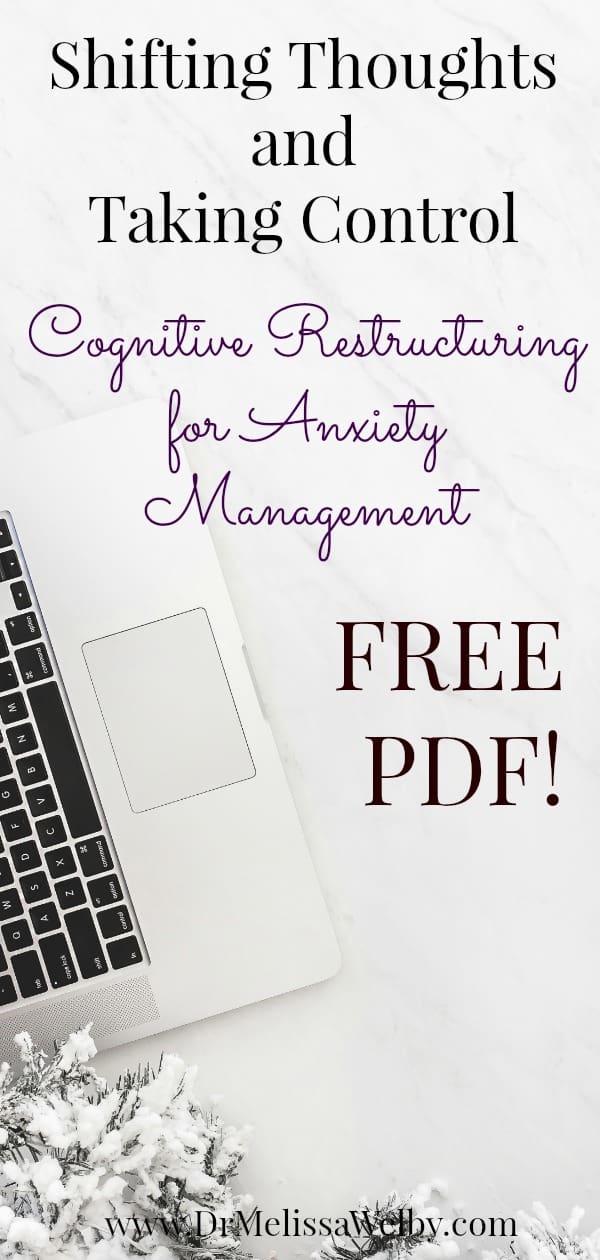Anxiety management and recovery require recognizing anxious catastrophic thinking when it is happening (read here for more details). Once recognized, you can reduce anticipatory anxiety by changing thoughts and interrupting projections. Break down these thoughts and create a framework to analyze them with cognitive restructuring techniques.
First, let’s review some definitions.
Anticipatory anxiety is all the time wasted dreading, worrying, and panicking over a future event (a projection of an imagined outcome) where every imaginable negative outcome is thought of (catastrophizing). Cognitive restructuring techniques are tools to help break down these thoughts and analyze them using a series of questions. These questions help to identify when a cognitive distortion (a thought that isn’t accurate or based in current reality) is driving your anxiety.
Cognitive restructuring techniques: Rethinking anxious catastrophic thinking 
Cognitive distortion scenario:
You had a friend over for dinner and when they left you told them to text you when they got home. You were worried because it was at night. Later, you realize your friend didn’t text but it is late so you are afraid to call and wake them if they are asleep. But what if they are in trouble? What if they got in an accident and that is why they didn’t call you. What if they have been attacked outside their home and are being killed right now?
Using this example I will give you an idea of how to break a thought down using cognitive restructuring techniques.
1. Are you overestimating the risk?
What is the evidence to support your worries?
Your friend didn’t text you when they got home and they said they would.
Is there another way to look at it?
Your friend was exhausted and forgot. They are now asleep.
2. Are you catastrophizing?
What’s the worst that can happen?
Your friend is killed and you could have intervened if you had called the police.
The best?
They are asleep in bed.
What is the most realistic outcome?
They are asleep in bed. They are a safe driver and have never been in an accident before. Altho an accident or attack could happen, it never has before and they are cautious. The likelihood that this is why they didn’t call is very low.
3. Is there another way to look at this?
Is it all or none or is there something in between? A shade of grey?
This is similar to the above answers but continues to break the thoughts down and provide alternative explanations with the most realistic outcomes.
4. How would I cope?
Am I underestimating my ability to cope? What resources do I have to get through this?
If you think back to times negative things have happened you will likely remember that it was unpleasant or painful but that you were able to reach out for help when you need it and gather up resources to recover. What difficult situations have you navigated through in your life? Did you learn something about your strength?
Many times, anxious catastrophic thinking isn’t about a life or death but a concern for an unpleasant outcome. For example:
- Not being able to fall asleep and then having a disastrous next day because of it.
- Losing control of your bowels because you can’t find a bathroom.
- Failing an exam.
- Having a panic attack while driving.
In all of these situations, it is important to step back and realize that you would be able to cope and your life will continue to go forward. Yes, it would be embarrassing if you had a “bathroom accident” but its a mere blip on the radar in life and doesn’t deserve the level of life-altering panic and avoidance that it gets.
5. Am I accepting anxious thoughts as fact without evidence?
Am I overvaluing anxious thoughts and feelings and accepting them as fact?
It’s important to realize anxiety thoughts for what they are: thoughts that will pass. Just because we are feeling anxious doesn’t mean it is evidence a certain situation will turn out disastrously.
How have your previous catastrophic predictions turned out?
Generally, catastrophic predictions are incorrect given they are not based on real facts. If you search back to other times you have catastrophized the likelihood is that you haven’t been correct with your prediction. Do you ever feel like the catastrophizing has helped you more than it is hurt you?
Putting cognitive restructuring techniques into action:
Use this practice sheet to walk through the questions when you have anticipatory anxiety and catastrophic thinking. If you are prone to catastrophizing, the good news is that you will have plenty of opportunities to practice! (That’s one way to put a positive spin on it, right?)
While learning cognitive restructuring techniques write out the worry and the answers to the questions. As you practice, it will become a more natural and ingrained process.
Try these exercises and let me know how it goes. Are there places you get stuck? Have you found a particular technique helpful?
Related articles about management of anxiety:
The Best Resources for Anxiety
Do what you are afraid of! Stop letting anxiety control you
Black and White Thinking- Don’t Fall Into the Trap!




Great article! Cognitive restructuring in to a positive thought pattern is a skill that we all need to improve. Thanks for sharing!
This is a great article! So true in many aspects. I like that you provide a practice sheet too. Thank you!
Thank you so much for this article! I was just at my therapist a few days ago and he gave me homework which included a few of the questions on your list! It was so affirming that this is the next step I need to take. Blessings to you!
Great news! These steps can be so useful to go through. Sounds like you found a great therapist.